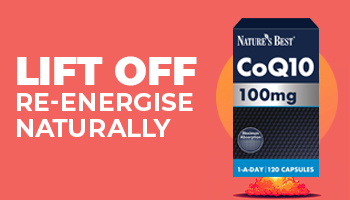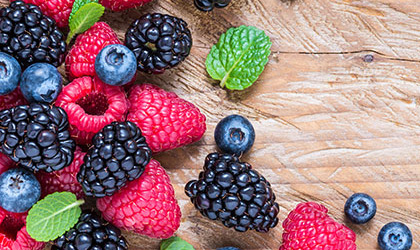
There are two forms of CoQ10: Ubiquinone (CoQ10) and Ubiquinol (‘active’ CoQ10). Both forms of CoQ10 are naturally present in the body. However, our body needs to convert CoQ10 into ubiquinol before it can be used to create energy. This is Herculean work! And it can get harder with age since the body’s ability to produce CoQ10 and convert it into ubiquinol declines as we get older. That’s why ubiquinol is a popular choice for people over 50.
Ubiquinol is coined the ‘body ready’ form of CoQ10; it requires no conversion, which allows for immediate uptake and fast absorption. For those looking to address established health concerns, ubiquinol is an excellent choice to restore a good baseline. Ubiquinol is also the only known fat-soluble antioxidant made naturally in the body, a unique property not shared by the ubiquinone form of CoQ10.
What is CoQ10?
You would be forgiven for not knowing much, or indeed anything, about this remarkable nutrient. It’s not every day we discuss our body at a cellular level. But insight into the world of CoQ10 is fascinating.
The human body is made up of cells. Inside almost every cell live thousands of mitochondria. Mitochondria are known as the ‘powerhouse’ of the cell; they produce the energy currency cells need to function in the form of ATP (Adenosine Triphosphate).
 CoQ10 (ubiquinone) and the active form ubiquinol help produce over 95% of the energy in the cell; it’s responsible for promoting ATP production in the inner membrane of the mitochondria.
CoQ10 (ubiquinone) and the active form ubiquinol help produce over 95% of the energy in the cell; it’s responsible for promoting ATP production in the inner membrane of the mitochondria.
How does CoQ10 work?
Without the support of CoQ10, the cell can’t function correctly. And this affects the health of tissues and organs. Just like a car, the cell needs fuel to operate. Inadequate levels of CoQ10 in the mitochondria may cause tiredness and fatigue, and even lead to trouble concentrating. With today’s fast pace of life, these are symptoms we could do without.
Ubiquinol can be found in dietary sources, such as chicken breasts, avocados and olive oil, to name a few. However, you'd have to eat the equivalent of 34 chicken breasts (6oz each) or 60 avocados or 133 tablespoons of olive oil to get anywhere near a relevant nutritional level.
Where can CoQ10 be found?
Back in 1957, extensive research at the University of Wisconsin into how mitochondria function, led to the discovery of CoQ10. Researchers found this molecule was essential for ATP energy formation. Due to the high-energy requirements of muscles, researchers were able to identify the heart muscle contained the greatest concentrations of mitochondria and, therefore, CoQ10.
Based on this information, researchers explored the value of CoQ10 in relation to heart health and energy levels. Since then, many studies have explored CoQ10’s role in the cardiovascular system. And that’s why CoQ10 is now recommended by many practitioners to support heart health.
How does CoQ10 affect the body?
CoQ10 is involved in the production of cellular energy and serves as an antioxidant. Both of these contribute to the preservation of cells. CoQ10 has been shown to help support heart health and blood sugar regulation. As an antioxidant, it may also minimise oxidative damage that can lead to specific health conditions[5].
How does CoQ10 affect cholesterol and heart health?
Statins are cholesterol-lowering drugs often prescribed to reduce the risk of developing or having a reoccurring heart health condition. Many factors determine if a person needs statins: high cholesterol, risk of developing a heart condition, a diagnosis of a heart condition, or a genetic condition [1]. Statins prevent the body from producing cholesterol and preventing plaque build-up in the arterial wall. It’s important to note that not all cholesterol, the fatty compounds circulating in the blood, are bad.
There are two types of cholesterol:
Low-density lipoprotein (LDL) is usually referred to as ‘bad’ cholesterol as it can accumulate in the arteries and create plaque deposits that restrict oxygenated blood ?ow to the heart. Health experts recommend limiting high cholesterol food sources, such as fatty cuts of meat, saturated vegetable oils, fried foods, processed meats, pastries and cakes.
High-density lipoprotein (HDL), on the other hand, is known as ‘good’ cholesterol since it helps sweep ‘bad’ cholesterol away from the heart and into the liver, where it can be expelled from the body. There are some excellent dietary sources of ‘good’ cholesterol, like fruit, vegetables, beans, oats and omega-3 rich salmon. For optimal cardiovascular health, you need a multi-pronged approach.
Why take ubiquinol with statins?
Statins are known to deplete the availability of CoQ10 in the cells, which explains why many people report increased fatigue and tiredness when taking the medication. Many health practitioners recommend CoQ10 supplementation in conjunction with statins to minimize its side e?ects.
Did you know that it’s estimated that 5.5 million people in the UK over 75 take a statin? Visit our online health blog for cholesterol and heart health articles.
What is ubiquinol?
There are two forms of CoQ10: ubiquinone (the oxidised form) and ubiquinol (the active form). The body has to convert ubiquinone into ubiquinol before it can be used, which is a fairly inefficient process, especially as we get older.
With superior bioavailability than ubiquinone, ubiquinol plays an important role in good overall health. This vitamin-like substance is involved in the production of cellular energy, heart function, male fertility, and the general wellbeing of ageing individuals.
Ubiquinol is widely known as one the most powerful known antioxidants, defending cells from the potentially harmful over-accumulation of free radicals and oxidative stress. Free radicals are created when the body converts food into energy. They also occur in response to external sources, like sun exposure, cigarette smoke, and pollution. Free radicals conspire to damage cells, protein, DNA, and they’re often called the villains behind ageing.
The ubiquinol form of CoQ10 is also the only known fat-soluble antioxidant made naturally in the body, a unique property not shared by the ubiquinone form of CoQ10.
Ubiquinol is only required in small quantities. However, since the body can’t synthesise it in sufficient amounts, it’s generally agreed that supplementation can be tremendously useful.
What does ubiquinol do to the body?
Here’s a summary of ubiquinol’s impressive properties:
-
Supports cellular energy production
-
Potent antioxidant that fights the effects of oxidative stress and free radicals
-
Supports a healthy heart and vascular system
-
Helps maintain healthy cholesterol levels
-
May support fertility and reproduction
Energy and performance
It’s a well-established fact that the most important role of CoQ10 is in cellular energy generation. This process produces 95% of our energy, which is then distributed to the brain, heart, and muscles. When we exert energy on an elevated level – be it mentally or physically – CoQ10 is indispensable for our overall performance.
Sports enthusiasts are keen to harness the ergogenic properties of CoQ10/ubiquinol. The Journal of the International Society of Sports Nutrition conducted a trial into the ubiquinol form of CoQ10 to understand if it enhanced peak power production in trained athletes. They discovered that physical performance was significantly enhanced when athletes took a daily ubiquinol supplement over 6 weeks [2].
Fatigue
It’s not just age that in?uences our energy levels; prolonged stress, a hectic lifestyle, poor diet choices and environmental factors can eat into our energy reserves. Although firing up the energy to perform daily tasks has a lot to do with our lifestyle choices, we can support our overall energy levels by incorporating a daily CoQ10 supplement.
How to choose the right supplement
If you are looking to supplement your diet with a CoQ10, you need to find a quality formula:
-
Naturally derived: Look for a product that’s made with 100% naturally fermented yeast since it’s biologically identical to the CoQ10 our body produces.
-
Go for a specialist: Choose a combination product for your specific health needs. If you’re looking to support heart health, you may consider CoQ10 combined with fish oil. The omega 3s found in ?sh oil is important for heart health. The long-chain fatty acids, EPA and DHA, contribute to the normal function of the heart*, the maintenance of normal blood pressure** and the maintenance of normal triglyceride levels (a type of fat), found in the blood.***
-
Go for advanced absorption: If you have digestive difficulties, are on cholesterol-lowering drugs, or have specific health concerns, ubiquinol is an excellent option. Choose a one-a-day 100mg product, as this is the equivalent of the dietary sources mentioned above in just one capsule.
How much CoQ10 should I take?
‘Bioavailability’ means the amount of a substance that has an active effect on the body. That’s why it’s worth checking the bioavailability of a CoQ10/Ubiquinol supplement; this determines how much is absorbed.
Likewise, it’s important to take the correct amount of CoQ10. 30mg is a great long-term choice for those between 30-40 years of age with a busy lifestyle who are simply looking to support their energy levels. 100-200mg, on the other hand, is often the level recommended for those on cholesterol-lowering medication.
If you’re looking to support your fertility, experts generally recommend anywhere between 100mg and 600mg.
The absorption of CoQ10/Ubiquinol supplement
CoQ10 is a fat-soluble nutrient, so it needs to be suspended in oil to ensure the intestine can absorb it, pass it into the lymphatic system, and then circulate it in the bloodstream. To ensure the very best absorption, the raw material needs to be fermented to achieve the purest form available.
When choosing a CoQ10/Ubiquinol formula, it’s important to consider absorption. Some products may use solubility enhancers to increase absorption, but these can come with side e?ects. It’s also worth choosing soft gel capsules that suspend CoQ10 in high-quality vegetable oil over powdered CoQ10.
A powerful biomolecule, there’s no doubt CoQ10 is important good overall health. To learn more about supplementing with CoQ10, you can have a free, confidential chat with one of our expert Nutrition Advisors here.
*A beneficial effect is obtained with a daily intake of 250mg of DHA and EPA.
**A beneficial effect is obtained with a daily intake of 3g/day of EPA and DHA.
***The beneficial effect is obtained with a daily intake of 2g/day of EPA and DHA.
References:
-
Heart UK. 2019. Statins. [ONLINE] Available at: https://www.heartuk. org.uk/getting-treatment/statins?gclid=
-
Journal of the International Society of Sports Nutrition. 2013. Ubiquinol supplementation enhances peak power production in trained athletes: a double-blind, placebo-controlled study. [ONLINE] Available at: https://jissn.biomedcentral.com/articles/10.1186/1550-2783-10-24.
-
AUA Journals. 2012. E?ects of the Reduced Form of Coenzyme Q10 (Ubiquinol) on Semen Parameters in Men with Idiopathic Infertility: a Double-Blind, Placebo Controlled, Randomized Study. [ONLINE] Available at: https://www.auajournals.org/article/S0022-5347(12)03419-2/abstract.
-
Kaneka. 2015. Fertility. [ONLINE] Available at: http://www.kaneka-ubiquinol.com/health-bene?ts/fertility/.
-
Healthline. 2022. 9 Benefits of Coenzyme Q10 (CoQ10). [online] Available at: <https://www.healthline.com/nutrition/coenzyme-q10#TOC_TITLE_HDR_14> [Accessed 11 January 2022].
You Might Also Like

Olivia
Olivia Salter has always been an avid health nut. After graduating from the University of Bristol, she began working for a nutritional consultancy where she discovered her passion for all things wellness-related. There, she executed much of the company’s content marketing strategy and found her niche in health writing, publishing articles in Women’s Health, Mind Body Green, Thrive and Psychologies.
View More






